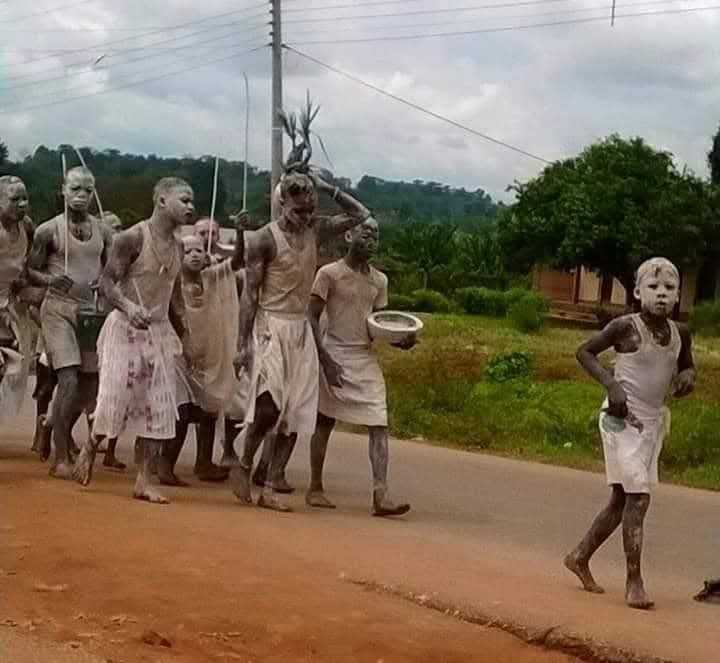
5 Things That Must Never Happen During the Holy
Every community has its sacred seasons, those moments when time seems to slow down and the people collectively turn inward. For the Ubulu people, that season is the Ịwu Holy Week.
In the Ubulu traditional calendar, the 2025 Ịwu festival promises to be no ordinary one but an Uje-Ukwu, meaning a “big ceremony.” According to tradition, the Holy Week began at midnight on the 6th of October, an Afọ market day, and stretched until nightfall on Friday Afọ, being the 10th day of October.
To Ubulu traditionalists, that week holds the same weight and reverence that the Holy Week holds in other faiths. It is a time for silence, peace, reflection, and communion with Chi-Ukwu (the Great God). It is also a time to remember Ezemu, the progenitor of Ubulu-Uku, who observed the very first Ịwu week before establishing the festival that has lasted through the centuries.
In fact, the well-known Ubulu saying, “Ịwu bịa n’afọ náa nẹ Nkwọ” (“Ịwu begins on Afọ and ends on Nkwọ”), comes from this sacred tradition. And when the week stretches longer than usual, the festival takes the form of an Uje-Ukwu, a truly grand celebration.
But for the sacred week to retain its purity, there are certain things that must never happen. Here are five taboos that define the sanctity of Ịwu Ubulu.
1. Death Must Not Occur
The Ịwu festival is one of peace and life. To die during this week is seen as deeply troubling, even suspicious. Such a death is believed to suggest that the person may have offended the gods.
Burial is strictly forbidden during this period. If someone passes, the funeral must wait until the Holy Week is over. For this reason, the curse “Ị sho n’Ịwu” (to die during Ịwu) is considered one of the most grievous insults in Ubulu culture.
Simply put, death can come another day, but never during Ịwu.
2. Silence Is Sacred
Shhhhh... É sịme wé Ịwu.
Silence is not just expected; it is required.
As the sacred yam (Ịwu) cooks and the Chief Priests lift prayers for the land, the community enters a hush. Singing, loud laughter, drumming, wood-splitting, and general noise are all forbidden.
This stillness sets Ịwu apart from other lively festivals such as Ine. The only exceptions are within the compounds of traditional chiefs or royal families, where limited sounds may be made for ritual reasons.
3. No War or Quarrels
Ubulu has known its share of wars, both internal and external. Yet in more than 800 years of history, Ịwu has never been skipped because of conflict.
During the Holy Week, no war, whether physical battles, family feuds, or verbal disputes, must take place. The people understand that Ịwu is a time to lay down weapons and grievances, no matter how heavy.
Even the death of a king only alters the scale of the festival (from Uje-Ukwu to a smaller version), but never its observance. So during this week, the watchword is clear: pray for Ubulu, not quarrel with Ubulu.
4. No Judgement or Execution
In ancient Ubulu, the King held power over life and death, and executions were carried out by a group known as the Idoloma. Yet no matter the crime, no execution could take place during the Holy Week.
The week must remain free of bloodshed, punishment, and strife. Even mourning is forbidden, wearing black or dark attire during Ịwu is seen as a disruption of its joyous, life-affirming energy.
5. (Implied by Tradition) Purity of Heart and Community
Though not often listed outright, the spirit of Ịwu demands purity in thought, word, and deed. The Holy Week is not only about avoiding physical taboos, it is also a call for every Ubulu son and daughter to turn inward, to reflect, to reconcile, and to seek peace with one another and with the divine.
Final Thoughts
The Holy Week of Ịwu Ubulu is more than ritualit is identity. It is a living connection between the people, their history, and Chi-Ukwu. Each prohibition, whether against noise or quarrel, death or judgment, serves to preserve the sacredness of this time.
And when the week unfolds without blemish, the community gathers in joy, celebrating the grand festival of life, peace, and unity that Ịwu has always been.


